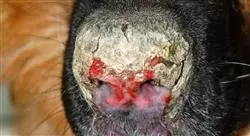University certificate
The world's largest faculty of veterinary medicine”
Introduction to the Program
A unique program in its field, which will allow you to learn with the highest quality through the most advanced online teaching course on the market"

For a correct diagnosis of infectious diseases, it is important to know the epidemiological environment in which patients are found and to know how to interpret diagnostic tests. Incorrect interpretation of a test could lead to loss of information or misdiagnosis. For this reason, this program will cover the different groups of diseases that are most prevalent in the practice.
Infectious diseases caused by viral agents develop different clinical pictures in dogs depending on the age of the animal and its immunity. Although many of these diseases are immunopreventable, they are an ongoing problem in the veterinary practice.
The group of infectious diseases caused by viral agents develop different clinical pictures in dogs depending on the age of the animal and its immunity. Although many of these diseases are preventable, they are an ongoing problem in the veterinary practice.
In the early stages of a puppy's life, viruses such as distemper or parvovirus can cause severe or disabling clinical issues in these pets.
Other pathologies, such as tetanus or botulism, are less frequent, but should be identified promptly for the application of the best therapy and to ensure, as far as possible, the patient's life.
Vector-borne diseases, i.e., hematophagous arthropods, are a group of different entities produced by bacteria, viruses, protozoa and helminths. They are considered emerging (and sometimes non-emerging) in daily canine clinical practice. These diseases produce a great diversity of clinical pictures, they can be asymptomatic or can cause the death of the animal.
Infectious diseases caused by parasites (nematodes, protozoa, trematodes and cestodes) are frequent in dogs, generally presenting with gastrointestinal symptoms; the group of pulmonary parasites produces emerging pathologies in the patient.
The infectious pathologies of major incidence in dogs, analyzed and studied in a clear, comprehensive and effective manner"
This Postgraduate diploma in Canine Infectious Diseases contains the most complete and up-to-date scientific program on the market. Its most notable features are:
- The latest technology in online teaching software
- Intensely visual teaching system, supported by graphic and schematic contents, easy to assimilate and understand
- Practical cases presented by practising experts
- State-of-the-art interactive video systems
- Teaching supported by telepractice
- Continuous updating and recycling systems
- Autonomous learning: full compatibility with other occupations
- Practical exercises for self-evaluation and learning verification
- Support groups and educational synergies: questions to the expert, debate and knowledge forums
- Communication with the teacher and individual reflection work
- Content that is accessible from any fixed or portable device with an Internet connection
- Supplementary documentation databases are permanently available, even after the program
An educational program based on the best working methods of the online educational panorama, revolutionary in the veterinary field"
Its teaching staff includes professionals belonging to the field of Veterinary Medicine, who bring to this program the experience of their work, as well as renowned specialists from reference societies and prestigious universities.
The multimedia content, developed with the latest educational technology, will provide the professional with situated and contextual learning, i.e., a simulated environment that will provide immersive education programmed to learn in real situations.
This program is designed around Problem-Based Learning, whereby the professional must try to solve the different professional practice situations that arise throughout the program. For this purpose, the professional will be assisted by an innovative interactive video system created by renowned and experienced psychology experts.
Fully compatible with your daily life activities, it will allow you to learn in a constant and gradual way, at your own pace, without losing educational effectiveness"

High-impact program that will give you the qualifications you need to act as an expert in this field of work"
Why study at TECH?
TECH is the world’s largest online university. With an impressive catalog of more than 14,000 university programs available in 11 languages, it is positioned as a leader in employability, with a 99% job placement rate. In addition, it relies on an enormous faculty of more than 6,000 professors of the highest international renown.

Study at the world's largest online university and guarantee your professional success. The future starts at TECH”
The world’s best online university according to FORBES
The prestigious Forbes magazine, specialized in business and finance, has highlighted TECH as “the world's best online university” This is what they have recently stated in an article in their digital edition in which they echo the success story of this institution, “thanks to the academic offer it provides, the selection of its teaching staff, and an innovative learning method aimed at educating the professionals of the future”
A revolutionary study method, a cutting-edge faculty and a practical focus: the key to TECH's success.
The most complete study plans on the university scene
TECH offers the most complete study plans on the university scene, with syllabuses that cover fundamental concepts and, at the same time, the main scientific advances in their specific scientific areas. In addition, these programs are continuously being updated to guarantee students the academic vanguard and the most in-demand professional skills. In this way, the university's qualifications provide its graduates with a significant advantage to propel their careers to success.
TECH offers the most comprehensive and intensive study plans on the current university scene.
A world-class teaching staff
TECH's teaching staff is made up of more than 6,000 professors with the highest international recognition. Professors, researchers and top executives of multinational companies, including Isaiah Covington, performance coach of the Boston Celtics; Magda Romanska, principal investigator at Harvard MetaLAB; Ignacio Wistumba, chairman of the department of translational molecular pathology at MD Anderson Cancer Center; and D.W. Pine, creative director of TIME magazine, among others.
Internationally renowned experts, specialized in different branches of Health, Technology, Communication and Business, form part of the TECH faculty.
A unique learning method
TECH is the first university to use Relearning in all its programs. It is the best online learning methodology, accredited with international teaching quality certifications, provided by prestigious educational agencies. In addition, this disruptive educational model is complemented with the “Case Method”, thereby setting up a unique online teaching strategy. Innovative teaching resources are also implemented, including detailed videos, infographics and interactive summaries.
TECH combines Relearning and the Case Method in all its university programs to guarantee excellent theoretical and practical learning, studying whenever and wherever you want.
The world's largest online university
TECH is the world’s largest online university. We are the largest educational institution, with the best and widest online educational catalog, one hundred percent online and covering the vast majority of areas of knowledge. We offer a large selection of our own degrees and accredited online undergraduate and postgraduate degrees. In total, more than 14,000 university degrees, in eleven different languages, make us the largest educational largest in the world.
TECH has the world's most extensive catalog of academic and official programs, available in more than 11 languages.
Google Premier Partner
The American technology giant has awarded TECH the Google Google Premier Partner badge. This award, which is only available to 3% of the world's companies, highlights the efficient, flexible and tailored experience that this university provides to students. The recognition as a Google Premier Partner not only accredits the maximum rigor, performance and investment in TECH's digital infrastructures, but also places this university as one of the world's leading technology companies.
Google has positioned TECH in the top 3% of the world's most important technology companies by awarding it its Google Premier Partner badge.
The official online university of the NBA
TECH is the official online university of the NBA. Thanks to our agreement with the biggest league in basketball, we offer our students exclusive university programs, as well as a wide variety of educational resources focused on the business of the league and other areas of the sports industry. Each program is made up of a uniquely designed syllabus and features exceptional guest hosts: professionals with a distinguished sports background who will offer their expertise on the most relevant topics.
TECH has been selected by the NBA, the world's top basketball league, as its official online university.
The top-rated university by its students
Students have positioned TECH as the world's top-rated university on the main review websites, with a highest rating of 4.9 out of 5, obtained from more than 1,000 reviews. These results consolidate TECH as the benchmark university institution at an international level, reflecting the excellence and positive impact of its educational model.” reflecting the excellence and positive impact of its educational model.”
TECH is the world’s top-rated university by its students.
Leaders in employability
TECH has managed to become the leading university in employability. 99% of its students obtain jobs in the academic field they have studied, within one year of completing any of the university's programs. A similar number achieve immediate career enhancement. All this thanks to a study methodology that bases its effectiveness on the acquisition of practical skills, which are absolutely necessary for professional development.
99% of TECH graduates find a job within a year of completing their studies.
Postgraduate Diploma in Canine Infectious Diseases.
Canine infectious diseases are diseases that affect dogs and are caused by different types of microorganisms such as viruses, bacteria, fungi and parasites. These diseases are spread when dogs come into direct contact with other infected dogs or contaminated materials such as food, water and objects such as dog bowls, toys, etc.
Refresh your knowledge of Canine Infectious Diseases with this Veterinary program.
Parvovirus: highly contagious and fatal disease that mainly affects puppies and young dogs. The virus causes an infection in the gastrointestinal tract, which can lead to vomiting, diarrhea and dehydration.
Distemper: a viral disease that causes flu-like symptoms in dogs, such as fever, cough, runny nose and eyes, and can cause neurological problems in more severe cases.
Bordetella: bacterial infection that causes kennel cough and is easily spread among dogs in enclosed or crowded spaces, such as shelters and daycare centers.
Lyme: a tick-borne disease that can affect both dogs and humans. Symptoms include fever, joint and muscle pain, and fatigue.
Leptospirosis: a bacterial disease that is transmitted through the urine of infected animals and can cause kidney, liver and neurological damage in dogs. <7p>
Rabies: viral disease that affects the nervous system and is fatal in all cases if not treated in time. It can also be transmitted to humans through the saliva of an infected animal.
TECH the world's largest digital university has a specialized academic program designed to provide a solid understanding of infectious diseases affecting dogs and how to prevent, diagnose and treat these diseases. Students will learn the most advanced techniques and effective strategies to manage and control canine infectious diseases. This program is intended for veterinarians seeking to specialize in canine infectious disease medicine, as well as those working in veterinary clinics, hospitals and research centers that focus on the prevention and treatment of these diseases.







